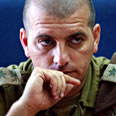
Colonel Avi Peled
Photo: Alex Kolomoisky
"Anonymous testimonies against the Israel Defense Forces are unworthy," Golani Brigade Commander Colonel Avi Peled said Wednesday in response to an activist group's claim that it has testimonies of dozens of soldiers who said they were ordered to "shoot first, ask questions later," during Israel's January offensive in the Gaza Strip.
Earlier, the Breaking the Silence activists' group claimed to have print and video testimony from over 30 IDF soldiers stating their commanders ordered them to use indiscriminate fire and not worry about the possibility of harming civilians, in an attempt to minimize casualties among Israeli forces during Operation Cast Lead.
Assuming Responsibility
Defense minister calls on soldiers who have any criticism, information or reservations over army's conduct to direct them to him, rather than to activist organizations like Breaking the Silence which has released anonymous testimonies from Gaza offensive
"The soldiers taking part in Operation Cast Lead had overwhelming support, within and out of the military. We had achievements and it is precisely after such achievements that people are looking for ways to abase (the IDF)," he said.
"Maybe it's political and maybe there's another motive behind it," he said, "but either way anonymous testimonies are unworthy. If anyone has any solid evidence they should present it to us and we will look into it. It's a better way to go about it than slander."
The Golani commander added that he knows "what the spirit of the IDF and the spirit of Golani are. The inquest (into the operation) found nothing out of the ordinary, but we are still learning new things. Naturally, if we find out that someone lied or breached orders or protocol we will deal with them to the fullest extent."
Peled also addressed one specific testimony by an Egoz Reconnaissance Unit reservist, who said that the troops were ordered to apply the "Neighbor Procedure," in which civilians were forced to enter suspect buildings ahead of troops.
The soldier's conclusions, claimed Peled, "are based on rumors and partial information of situations that occurred at a time when he wasn’t even with the unit. This matter has been probed during the operation and after it and I can say, with absolute certainty, that we never forces any civilian to go into a house."
Peled, who was himself injured during the fighting, added that the military's inquest into the fighting found dozens of cases in which IDF soldiers went out of their way to assist the local Palestinians.
"We made sure families who were afraid to evacuate had food and water and we kept them safe. The results of this operation could have been very different if we hadn’t acted the way we did. Our soldiers have faith in their moral code and they know they were doing the right thing, even in the face of slander."
The IDF also criticized the report, which it said was "full of general anonymous testimonies, none of which were verified." The report, added the statement, "was published without allowing the IDF the basic courtesy of ascertaining any of the testimonies or comment on them prior to their publication, all while defaming the IDF and its officers."















